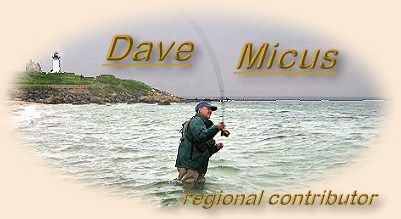|
"Perfection is finally attained," observed Antoine
de Saint-Exupéry, "not when there is no longer
anything to add, but when there is no longer
anything to take away," and lately I'm thinking
this is applicable to a lot of things, but
especially fly tying. I came to this conclusion
after a frantic day of blitz fishing, where the
striped bass ripped my meticulously tied feather
wings to shreds, and, with nothing else in the
fly box, I caught just as many, if not more, on
what was practically a bare hook with a few wisps
of bucktail that probably took 30 seconds to tie.
It won't be easy to change my evil ways, though.
I don't tie sparse flies for the same reason I
don't cook a decent dinner. I always feel like
the recipe requires just a little more, and many
a good meal and fly has been ruined by an extra
pinch of salt or fur. I just can't help but add
a few more feathers here, some flash there, a
couple of eyes, and before I know it I don't
have a fly but a feather duster. Maybe I find
it counter intuitive that less can be more, or
maybe I add hair as a subliminal reaction to
losing my own. No matter. I chuck big flies
at fish believing they prefer a big meal and
this explains in large part why I'm not a very
good trout fisherman.

I'm lucky that I tie salt-water flies, large long
things that are easy to tie and can absorb my
additions without too much of a negative impact.
And, unlike the tiny dry flies where an extra
turn of hackle can be the difference between
catching fish or catching skunk, the saltwater
fly, at least the striper fly, relies on profile
probably more than anything else. There are still
those who, fly fishers being on the whole an
obsessive/compulsive lot, insist on precise
imitations, but I've never been in a situation
where bass are hyper focused on a specific baitfish
pattern, the one exception being a clam worm hatch,
and even then you can catch fish on the fringes with
a pattern other than the clam worm.
For the fly fisher the vise is the pallet where the
creative juices flow, and this is especially true
of the salt-water tyer not bound by the conventions
of tying that haunt your freshwater perfectionist.
I've modified quite a few patterns to suit my own
aesthetic needs without insulting the originator
or the fish. For example, I add prismatic eyes
to almost any pattern I tie because eyes are a
trigger to bass. I eliminate peacock herl
toppings from patterns that call for it as I
find that the herl, heavier than the wing material,
will usually foul at the hook bend, but instead use
a darker bucktail to give a profile. My favorite
fly this season has been a Thunder Creek style flat
wing streamer, a marriage of the thunder creek
streamer and feather-winged patterns, that I
credit as my own design though it probably isn't.
And after the experience with the blitzing bass,
I rushed home to tie some simple blonde patterns,
but after only one the fly metamorphosed from a
simple streamer to a baby bunker:

The extra effort and materials are usually for
naught, as the bass don't seem to appreciate
how much time I spend on a fly. When they do
I have inevitably only tied one example, and,
if it rides off into the sunset in the lip of
a large fish, I'm not only without a replacement
but also lacking a model for tying more. So it's
back to the tying board and more experiments.

I doubt I'll change, though. I realize that
I'm not tying to catch fish. Free of the
constraints of instructions and limited only
by my imagination, I tie big, colorful, weird
flies that you'd never find at Orvis.
Fortunately, the striped bass don't seem to mind... ~ Dave
About Dave:
 Dave Micus lives in Ipswich, Massachusetts. He is an
avid striped bass fly fisherman, writer and instructor.
He writes a fly fishing column for the Port City Planet
newspaper of Newburyport, MA (home of Plum Island and Joppa Flats)
and teaches a fly fishing course at Boston University.
Dave Micus lives in Ipswich, Massachusetts. He is an
avid striped bass fly fisherman, writer and instructor.
He writes a fly fishing column for the Port City Planet
newspaper of Newburyport, MA (home of Plum Island and Joppa Flats)
and teaches a fly fishing course at Boston University.
|









